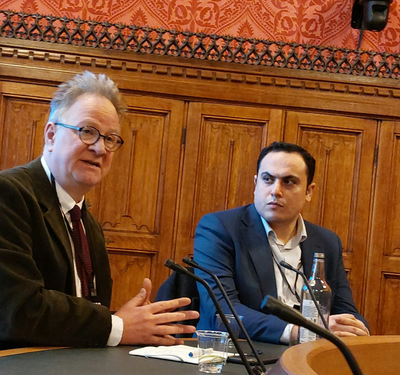Gaza’s journalists need our support
On International Day for Palestinian Journalists, Tim Dawson, IFJ deputy general secretary, reports on the ongoing need to extend our "solidarity, friendship and support" to Palestinian journalists.
Last weekend, The Times (London) devoted two pages to a striking interview with Palestinian journalist Amal Helles. It was a gruelling read, but underlined how important it is that today journalists all over the world will stand with their Palestinian colleagues.
After reporting on months of bombardment, Helles has finally left Gaza with her children Maryam and Wajj, aged six and four. Her husband Samed, also a journalist, has stayed in Gaza from where he continues to report.
“I hated the night most”, Helles told Alice Thomson. “We would lie in the darkness, my husband and I, my beautiful young daughter and son warm between us, so if the bombs came, we could all die together. I felt grateful every morning that we had survived but we were so tired of homelessness and helplessness; tired of surviving death.”
She talked also about the destruction of their home in Khan Yunis, about the obliteration of the fixed points of their hitherto happy family life such as the Kids Land amusement park, and favourite restaurants. They left in a hurry, carrying only birth and marriage certificates, medicine and one toy for each child.
Helles’ personal narrative is only a fragment of the story of what has happened to Gaza’s media workers, of course. Since the conflict began, the only journalists reporting from Gaza have been from Gaza itself. Despite unrelenting requests, international correspondents have been barred from entering. This has left around 1,000 reporters to cover events in Gaza. Like Helles, almost all have lost their homes, have little or no food, and walk to assignments carrying equipment on their shoulders. Helles describes how she and her children have resorted to drinking water from puddles in the street. She won’t be alone in this.
These privations the journalists share with every other Gazan. What singles out the reporters is the terrible mortality rate they have experienced – more than ten per cent of them have been killed. This is a dramatically higher death rate than the general population, around 1.3 per cent have lost their lives, or health workers, where almost 2.5 per cent have perished. As a further military comparison, during the Vietnam war, the US Marine Corp lost 5 per cent of deployed soldiers.
Helles is scrupulous about not commenting on the actions of the Israeli government, save to say that she wants to see peace and thinks a ceasefire necessary. Many of her colleagues in Gaza are less guarded. It is their nearly universal view that they are deliberately targeted by Israeli soldiers.
They point out that Israel has access to software that infects users’ mobile phones and allows detailed patterns of their movements to be collated. The IDF has also been using an AI-driven targeting system called Gospel, that allows weapons systems such as drones to chase down targets within seconds of their location being known, and on a scale without precedent in warfare.
Taken in combination they make a compelling case to answer, if not a judicially-sanctioned verdict. Many in Palestine will be pinning their hopes on the investigation that has already been launched by the International Criminal Court. It will no doubt be of interest to that investigation that such a sophisticated targeting system will create records. If these are made available to the ICC, they should provide a unique evidential trail.
That is for the future, however. At this moment, the IFJ’s attention is on supporting the journalists who remain in Gaza as best we can – something we do in close co-operation with our affiliate, the Palestinian Journalists Syndicate (PJS).
Since the outset of the conflict, the IFJ’s International Safety Fund has provide aid via the PJS, used to supply blast trauma kits, and battery packs to journalists on the ground. More recently PJS has provided basic food stuffs, clothes and tents. Cash payments have been made to women journalists in Gaza to help meet the cost of regular expenditure on sanitary items that have been subject to intense inflation.
The IFJ’s contribution to this has only been possible because of the generosity of journalists unions and associations around the world, as well as donations from individual journalists. Hundreds of donations have flooded in – although, of course, more is always needed.
Helles’ interview concludes with a hint of the impact that the trauma has had upon her and her children. The fate of her husband and wider family is still in the balance. All their possessions are gone. Slammed doors or other sudden noises terrify the children.
There isn’t a citizen in Gaza who doesn’t share some element of these wounds – and many have experienced far worse. How and when healing from those will start, we don’t know? What we can be certain of, however, is that when it does, for it to have any hope, support from all over the world will be needed. Standing with Gaza’s journalists today – even if only for a minute – is a sign to those suffering the most, that their pain has not gone unnoticed, and that they can count on our solidarity, friendship and support from around the world.
This is based on a speech given at a meeting in the House of Commons on 26 February 2024.

Tim Dawson and Ahmed Alnaouq
© Umit Ozturk
https://blogs.soas.ac.uk/cop/event/the-targeting-of-palestinian-journalists/
